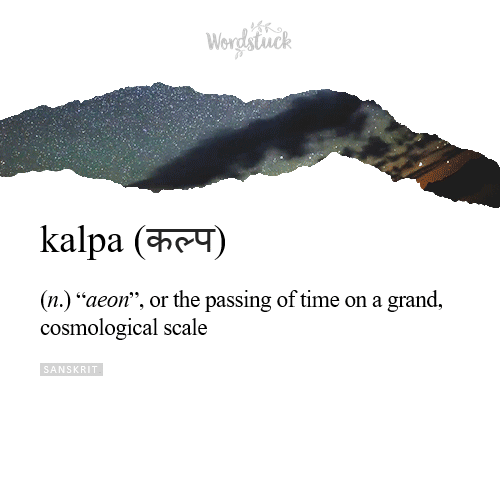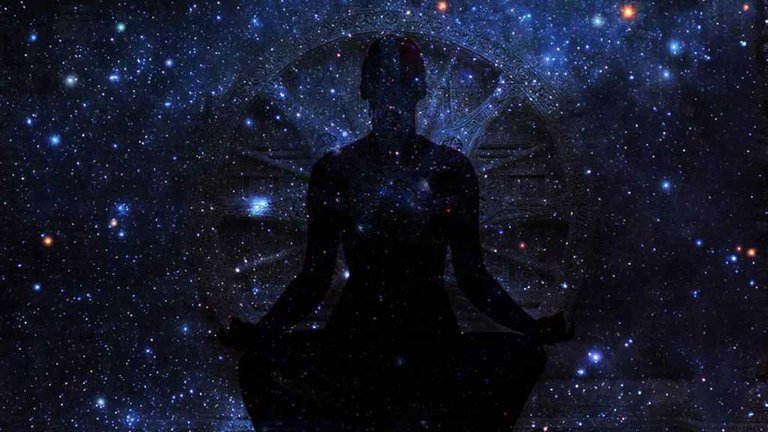Hello peeps! @ailindigo here! :)
This is the 34th week of Unstranslatable Words and this time we're going back to South Asia, specifically to India, a country known for its big role in global culture thanks to their movies and music, as well as their spiritual teachings, an aspect of their culture we're going to dive into with this week's word.
This week's word is the sanskrit: kalpa कल्प.

Gif by Wordstuck
kalpa कल्प
I've heard this word only a couple of times becase of expressions and geology, but very few couple of times; so when I found this word meaning in both Hinduism and Buddhism, it kind of shocked me a little in a way as unexplainable as the age on the universe.
A kalpa is a long period of time (aeon) in Hindu and Buddhist cosmology, generally between the creation and recreation of a world or universe. *
This is a sanskrit term mainly used in both Hindu and Buddhist cosmology that literally means "a formation or creation," sometimes spelled calpa in British English, where its artuchaic spelling is kalp, with other forms of kalpam, kalpānāṃ, and kalpe, derived from klip (Sanskrit: कॢप्, romanized: kḷp, lit. 'to create, prepare, form, produce, compose, invent'). Even though Hindu and Buddhist definitions have some little differences, the concept is the same in essence.
In Hinduism, kalpa is one the Hindu units of time, which are described in Hindu texts ranging from microseconds to trillions of years, including cycles of cosmic time that repeat general events in Hindu cosmology; and there Time (kāla) is described as eternal. A kalpa is equal to 4.32 billion years, a "day of Brahma" or one thousand mahayugas, measuring the duration of the world. Each kalpa is divided into 14 manvantara periods, each lasting 71 Yuga Cycles (306,720,000 years). Preceding the first and following each manvantara period is a juncture (sandhya) equal to the length of a Satya Yuga (1,728,000 years). A kalpa is followed by a pralaya (dissolution) of equal length, which together constitute a day and night of Brahma.
Thus, a month of Brahma contains thirty such days and nights, or 259.2 billion years. According to the Mahabharata, 12 months of Brahma (=360 days) constitute his year, and 100 such years his life called a maha-kalpa (311.04 trillion years or 36,000 kalpa + 36,000 pralaya). Fifty years of Brahma are supposed to have elapsed, and we are now in the Shveta-Varaha Kalpa or the first day of his fifty-first year. At the end of a kalpa, the world is annihilated by fire.

Time in Hinduism
Now, in the Pali language of early Buddhism, the word kalpa takes the form kappa, and is mentioned in the assumed oldest scripture of Buddhism, the Sutta Nipata. This speaks of "Kappâtita: one who has gone beyond time, an Arahant". Though, there are four different lengths of kalpas. A regular kalpa is approximately 16 million years long (16,798,000 years), and a small kalpa is 1000 regular kalpas, or about 16.8 billion years. According to Buddhism, the previous kalpa was the Vyuhakalpa (Glorious aeon), the present kalpa is called the Bhadrakalpa (Auspicious aeon), and the next kalpa will be the Nakshatrakalpa (Constellation aeon).
But what I really find fascinating the most, even though Buddha never talked about the exact duration of a kalpa in years, is the analogies he used, especially the one he gave when some monks wanted to know how many kalpas had elapsed so far: If you count the total number of sand particles at the depths of the Ganges river, from where it begins to where it ends at the sea, even that number will be less than the number of passed kalpas. It's shocking.
I used to often wonder about the universe's age and also about not only its beggining but its end, when you think of every living thing on this planet you'll see all of them have an end, and this is why we've come to it being a natural happening; everything works in cycles, so to me it makes sense the world is going to end someday. This is a thought and somehow belief I've been thinking about often in this last year (maybe influenced on everything that's been happening, both good and bad things) and funny thing is that today I just got it reminded me today while having a little convo with my coworker. Thinking about how old is the universe isn't something very pleasing, it actually can be a little scary (like Lovecraft's cosmic horror) but it can be also mesmerizing, because of a certain feeling of reassurance and hope it gives and can't explain.
What do you think? Does the universe and everything really have an end? Is the universe really this old? Please feel free to let me know what you think in the comments!
Thank you very much for passing by! And if you have an Untranslatable Word you'd like to suggest, please don't hesitate to do so! :)
Previous Untranslatable Words:
#32: ishin-denshin - Japanese telepathy
#33: gökotta - connecting with nature and ourselves
This content is part of a new series to get more people interested on languages and how they, perception and culture are related!
Exclusively for the Hive Cross Culture Community, the community for language exchange and cross-cultural purposes.
If you'd like to be part of the discussion don't hesitate to hop into the Hive Language and Culture Exchange Discord server! As well as subscribing to the Hive Cross Culture Community so you don't miss any new word comming ;) We'll be sharing a new Untranslatable Word each week!

Yeah currently Sweta kalpa is going on. Also according to Hindu mythology, ongoing yug(age) is kalyug which means age of demons or age of darkness. It started in the end of Mahabharata where millions of people were killed in the war. I kinda feel this mythology is real coz as we can see so many illegal stuffs, mass killing of people, nuclear war is happening in this time frame. It will continue till another 0.5 million year according to Hindu mythology. And then another yug called satyayug ( age of truth) will start).
Feels so good reading this post. Thanks for sharing
Heya! :D I kinda feel this mythology is real because of a couple of coincidences, so I agree with you. I'm glad you liked it, thanks for stopping by! :D
Yeah. Thanks for publishing this post so that I can relate to it. ☺️